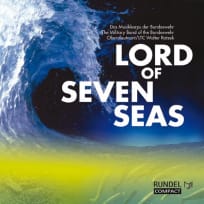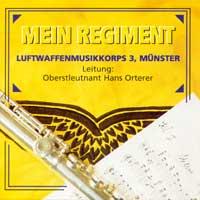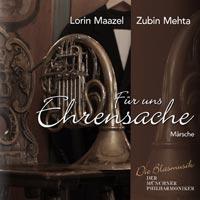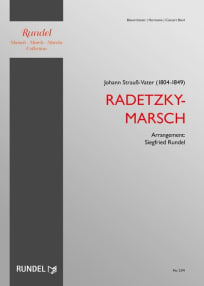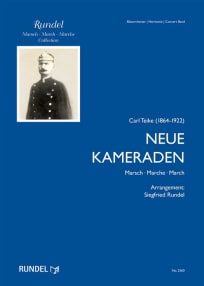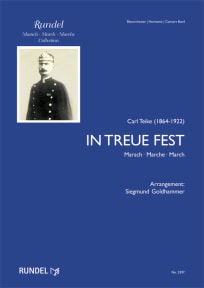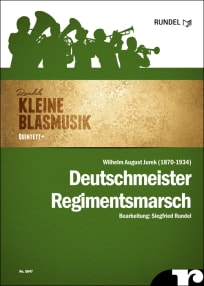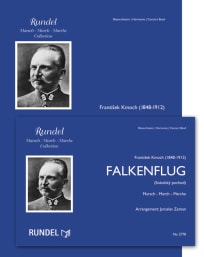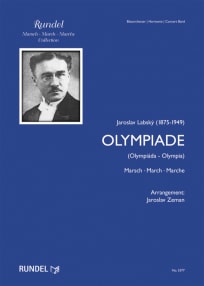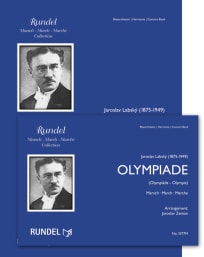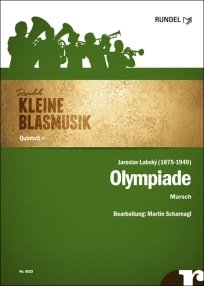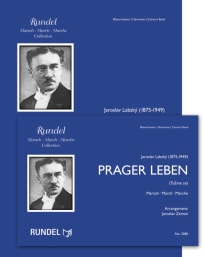Orchestre d'Harmonie
Alte Kameraden
Old Comrades
Marschformat / March Size
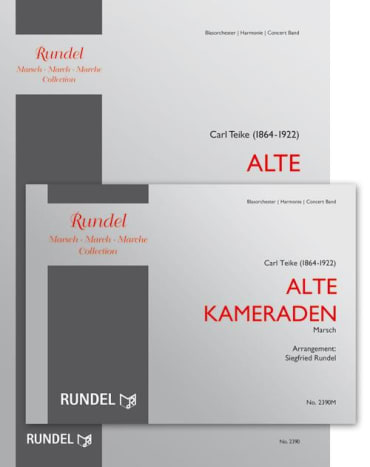
Orchestre d'Harmonie
Alte Kameraden
Old Comrades
Marschformat / March Size
Compositeur
Arrangeur
Durée
00:03:00
Difficulté
Mittel-/Oberstufe
Maison d'édition
Rundel
Format
Petit Format
Info
Partition + Conducteur + Parties
Numéro d'édition
MVSR2390M
Date de publication
2001
Info
It is the greatest tragedy in the life of a young composer if he happens to write his most successful piece at the beginning of his musical career. This holds true for Carl Teike, as the unsurpassed success at the beginning of his musical life was his march “Old Comrades”. It is a sparkling piece that may well be labeled to be the German “march of marches”. Carl Teike was born on Feb. 05, 1864 in Altdamm. After his parents had moved to Stettin, he had early contacts with military music as a youngster. The enthusiasm for this kind of music never left him throughout his life. He began a musical apprenticeship with City Music Director Böttcher in Wollin and already played in the spa orchestra of Bad Misdroy, which Böttcher conducted. Upon completing his apprenticeship, he enlisted as a volunteer in the band of the (5th Württemberg) King Karl Grenadiers No. 123 in Ulm. The musical and military environment there proved to be ideal for the ambitious young musician, who hoped to eventually study band music at the University of Music in Berlin. Above all, his military superior, bandmaster Julius Schreck supported young Teike wherever he could. Unfortunately the time in Ulm took a very unhappy turn, as Schreck’s successor was extremely resentful towards Teike, and musical support was replaced by sheer harassment. On account of this, Teike retired from the military towards the end of 1889. Short employments in Ravensburg and Ulm evidently did not suit Teike, who was of northern German descent. This is why he applied for the Royal Police Force in Potsdam. Teike was accepted and entered service in 1895. The royal capital of the Hohenzollerns obviously stirred Teike to write a number of brilliant marches. He even became known abroad as the “musical policeman”. Unfortunately he contracted a severe pneumonia while on duty, which eventually forced him to retire from the Royal Police Force in Potsdam. On February 01, 1909 he and his family moved to the prosperous provincial city of Landsberg on the Warthe (which is located east of Berlin in present-day Poland). There, Count Clairon d’Haussonville proved to be an understanding superior who paved the way for modest Carl Teike to continue composing, as his creativity had not suffered from this move. The disease which he had caught in Potsdam evidently was more severe than he was inclined to accept. In spring 1922, his state of health became worse, and in May of that year he passed away. Much too early - as many people felt. Teike’s marches constitute an enrichment of the German concert march, as he never composed any street marches. Clear structures, musical ingenuity and a multitude of tone colors distinguish his works and shape them into something really new. It is this type of the march in particular that became the bedrock of the universal appeal of the German march. Even today Teike’s marches stand unrivaled for musical quality and content – and they never are aggressive. Toward the end of his tour of duty in Ulm, Teike handed a new march to his superior, which, at the time, did not have a title yet. He in turn told Teike to “put it in a stove and burn it”. As we know today, this was a classic misappraisal, as Teike subsequently named his march “Old Comrades” in view of his impending retirement. We do not even need to discuss the acceptance the march has met and still meets all over the world, as “Old Comrades” simply always has been a march of universal appeal. In his new arrangement, Siegfried Rundel did not change the essence of Teike’s music, he rather sensitively adapted it to modern musical practice and to the instrumentation of the symphonic band on the basis of his deep respect for the works of Carl Teike.
Also available in Concert Size A4 (see number MVSR 2390)
Also available in Concert Size A4 (see number MVSR 2390)
Mots clés
Nachschlagewerk der Volkstümlichen Blasmusik
Adieu
Allemagne
Camarade
Marche
Marches Militaires
Marches traditionnelles
Militaires
Patrie
Petit Format
RUNDEL YouTube Chaîne
Écoutez et lisez sur la chaîne YouTube de Rundel
RUNDEL VIDEO
Alte Kameraden - Old Comrades
Les partitions sont disponibles a l'adresse suivante:
https://www.rundel.de/fr/
Konzertformat / Concert Size
Difficulté France: 1re Division / Grade 3+
Difficulté Belgique: Eerste / Grade 3+
Compositeur: Teike, Carl
Arrangeur: Rundel, Siegfried
Catégorie: Marche de concert, Marche, Marche Traditionelle
Durée: 00:03:00
Maison d'édition: Rundel
Format: A4
Info: Partition + Conducteur + Parties
Rundel Numéro d'édition: MVSR2390
Date de publication: 2001
https://www.rundel.de/fr/
Konzertformat / Concert Size
Difficulté France: 1re Division / Grade 3+
Difficulté Belgique: Eerste / Grade 3+
Compositeur: Teike, Carl
Arrangeur: Rundel, Siegfried
Catégorie: Marche de concert, Marche, Marche Traditionelle
Durée: 00:03:00
Maison d'édition: Rundel
Format: A4
Info: Partition + Conducteur + Parties
Rundel Numéro d'édition: MVSR2390
Date de publication: 2001



